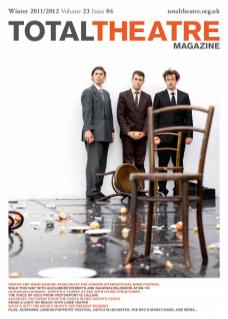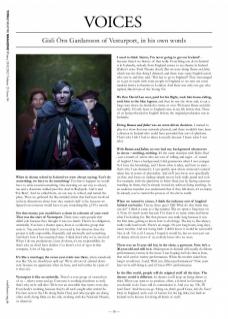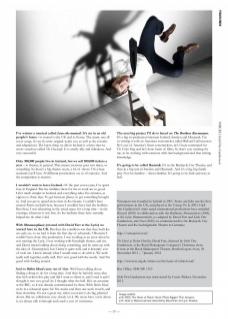When in drama school in Iceland we were always saying, ‘Let’s do something, we have to do something.’ For that to happen we would have to unite around something. One morning on our way to school, me and a classmate walked past this shed in Reykjavik. And it said ‘For Rent’. And we called them, on our way to school, and rented the place. Then we gathered the like-minded artists that had been involved in these discussions about how they wanted stuff to be, because we figured out everyone would have to pay something like £150 a month.
For that money you would have a share in a theatre of your own! That was the start of Vesturport. There were some people that didn’t join because they thought it was too much. There’s no obligation, artistically. You have a theatre space, there is a collective group that rents it. You can look for help if you need it, but whoever does the project is fully responsible, financially and artistically and everything. And that’s how it has remained since. I think that’s why we’ve survived. When I do my productions, I just do them, it’s my responsibility. So that’s why we don’t have clashes. Cos there’s a lot of egos in that company. A lot of big egos.
It’s like a marriage; the seven year crisis was there, when somebody was like ‘Ah, we should just split up.’ We’ve all sort of calmed down now because we appreciate what we have, and we’d rather be a part of it than not.
Vesturport is like an umbrella. There’s a core group of around ten of us – others come and go. Everyone is working elsewhere as well, that’s why we’re still alive. We’re not an ensemble that meets every day. Everybody’s working, because they’re all such sought-after artists! So I’m here now in the UK doing Robin Hood, and other people are doing other stuff, doing films on the side, working with the National Theatre, or whatever.
I used to think ‘damn, I’m never going to get out Iceland’ – because there’s no history of that really. Everything you do in Iceland is in Icelandic, nobody from England comes to see theatre in Iceland [Editor’s note: Total Theatre does!]. But we were doing Romeo and Juliet, which was the first thing I directed, and there were some English actors who saw it, and they said, ‘This has to go to England!’ They encouraged us to get in touch with some people in England, so we sent out some random letters to theatres in London. And there was only one guy who replied, David Lan of the Young Vic.
We flew David Lan over, paid for his flight, took him horse-riding, took him to the blue lagoon, and then he saw the show and, to cut a long story short, he decided to invite us over. We learnt Romeo and Juliet in English. I’d only been to England once in my life before that. None of us had performed in English before; the original production was in Icelandic.
Doing Romeo and Juliet was an actor-driven decision. I wanted to play in a show that was seriously physical, and there wouldn’t have been a director in Iceland who could have provided that sort of platform. That’s why I felt I had to direct it myself, because I knew what I was after.
With Romeo and Juliet, no one had any background whatsoever in circus – nothing, nothing. It’s the same situation with Robin Hood – just a bunch of actors who are sort of willing and eager – if scared of heights! I have a background; I did gymnastics when I was younger. So I have the knowledge, and I know what it takes, and how to train – that’s why I can demand it. I can quickly spot where someone’s natural talent lies, in terms of physicality. And we’ll just focus very specifically on that, and focus on making simple moves look really grand and cool. For example, with the platforms in Robin Hood, just by having someone standing on them, they’re already in mid-air, without doing anything. As an audience member you understand that if they fall down, it’s an injury. So already you’ve started the process of the circus world.
When we turned to circus, I think the industry sort of laughed behind our backs. ‘Circus, these guys? Pffff. What do they think they can do?’ I think it came as a big surprise. But we spent a long time on it. Now, it’s much easier because I’ve done it so many times and know what I’m looking for. But that process was really long because it was the first time, getting to know how to do things. The key is, like always, really really hard work. There’s no magic. It’s just long hours, long days, many months. And not losing faith. I didn’t know it would be successful. Not at all. Not at all. I mean, I hoped it would be, but we were just out of drama school, most of us, nobody knew who we were.
There was an 11-year-old boy in the show, a gymnast. Now he’s a 20-year-old and still in it. Shakespeare in Iceland will usually do fifteen performances, twenty at the most. I was hoping we’d do that at least, that we’d survive twenty performances. When his mother asked how long it would run. I said, ‘Well, ten, fifteen performances?’ Nine years later we’re still doing it, and it’s been 400+ performances.
In the film world, people will do original stuff all the time. The theatre world is different. In theatre you’ll keep on being drawn to titles. When you want to co-produce, often, a festival in Germany, if you decide to do Faust, will co-commission it. And you say, ‘Ok, I’ll read Faust.’ And then you go ‘Hang on, that’s good! Guys, let’s do Faust.’ Here in England, we’re sort of known for the big titles, but back in Iceland we’re known for doing all kinds of stuff.
I’ve written a musical called Love: the musical. It’s set in an old people’s home – it toured to the UK and to Korea. The music was all cover songs. So we do write original works too, as well as the reworks and adaptations. The latest thing we did in Iceland is a farce that we wrote ourselves called The Housewife. It is utterly silly and ridiculous. And very successful.
Only 300,000 people live in Iceland, but we sell 500,000 tickets a year – to theatre, in general. That means everyone goes two times, or something. So there’s a big theatre scene, a lot of shows. On a busy weekend you’ll have 30 different productions on, so it’s massive. And the competition is massive.
I wouldn’t want to leave Iceland. Of the past seven years, I’ve spent four in England. But the facilities there for me to work are so good. Life’s much simpler in Iceland, and everything takes five minutes, as oppose to three days. To get between places, to get something brought in. And you get to spend more time in the theatre. I couldn’t have created Romeo and Juliet here, because I wouldn’t have had the facilities. But there, I was rehearsing in the actual space for a long time – in the evenings, whenever it was free. So the facilities there have certainly helped me do what I did.
With Metamorphosis (created with David Farr at the Lyric) we started here in the UK. But then the condition was that they built the set early on, so we had it from the first day of rehearsals. Otherwise I couldn’t have done that production. I was working as an actor when he was running the Lyric, I was working with Kneehigh theatre, and me and David started talking about doing something, and he came up with the idea of Metamorphosis, but I knew it quite well, and it instantly sort of took me. I knew already what I would want to do with it. We work really well together, really well. He’s very good with the words. And I’m good with fooling around.
And so Robin Hood came out of that. We’d been talking about finding a thing to do for a long time. And then he had this crazy idea that he’d written this play and did I want to direct it, and I read it and I thought it was very good. So I thought what the hell. He’s an associate at the RSC, so it was already commissioned by them. With Robin Hood, we’re in a rehearsal space for five weeks and then one week in tech, and then showtime. It’s not a great way when you want to do big, physical shows. But we collaborate very closely on it. We never have a row about it, we always talk it through and reach a sort of consensus.
The next big project I’ll do is based on The Brothers Karamazov. It’s a big co-production between Iceland, Sweden and Denmark. I’m co-writing it with an American screenwriter called Richard LaGravenese. He’s one of America’s finest screenwriters, he’s Oscar nominated for The Fisher King and he’s done loads of films. So that’s very exciting for me, to be working with someone with that background and that writing knowledge.
It’s going to be called Bastards. It’s in the Reykjavik City Theatre, and then in a big tent in Sweden and Denmark. And it’s a big, big family play. Not for families – about families. It’s going to be dark and sexy as hell.
Vesturport was founded in Iceland in 2001. Romeo and Juliet was the first performance in the UK, and played at the Young Vic in 2003. Gisli Örn Gardarsson’s other major international productions have included Woyzeck (2005) in collaboration with the Barbican; Metamorphosis (2006) at the Lyric Hammersmith, co-adapted by David Farr and Gisli Örn Gardarsson, and Faust (2010) co-commissioned by the Reykjavik City Theatre and the Ludwigshafen Theatre in Germany. http://vesturport.com
The Heart of Robin Hood by David Farr, directed by Gisli Örn Gardarsson, is the Royal Shakespeare Company’s Christmas show. It runs at the Royal Shakespeare Theatre, Stratford-upon-Avon, 18 November 2011 – 7 January 2012.
http://www.rsc.org.uk/whats-on/the-heart-of-robin-hood
Gisli Örn Gardarsson was interviewed by Cassie Werber, November 2011.


